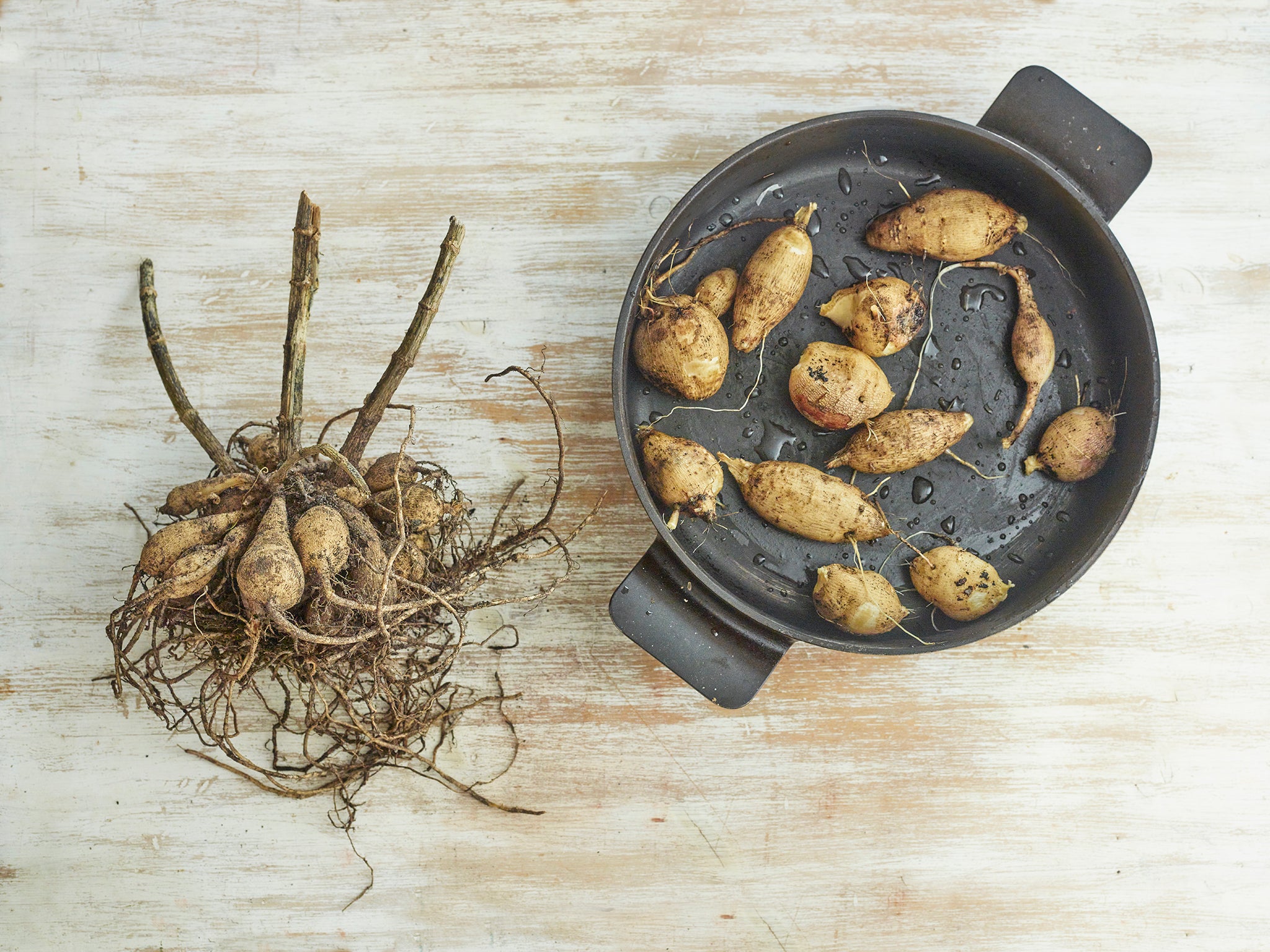Plants, fake sprouts and none of the trimmings: What does the future hold for the traditional Christmas dinner?
The climate crisis is already affecting our potato and Brussels sprout harvests, while animal feed for our turkeys has become incredibly expensive, writes Hannah Twiggs. We will have to change our Christmas dinners as a result. But would that be such a bad thing?


Your support helps us to tell the story
From reproductive rights to climate change to Big Tech, The Independent is on the ground when the story is developing. Whether it's investigating the financials of Elon Musk's pro-Trump PAC or producing our latest documentary, 'The A Word', which shines a light on the American women fighting for reproductive rights, we know how important it is to parse out the facts from the messaging.
At such a critical moment in US history, we need reporters on the ground. Your donation allows us to keep sending journalists to speak to both sides of the story.
The Independent is trusted by Americans across the entire political spectrum. And unlike many other quality news outlets, we choose not to lock Americans out of our reporting and analysis with paywalls. We believe quality journalism should be available to everyone, paid for by those who can afford it.
Your support makes all the difference.For such a joyful time of year, there’s an awful lot to be depressed about. Cost of living. A bird flu outbreak that means fewer turkeys this Christmas. Gen Z killing off Christmas pudding (not really, though). We could even be at risk of losing our traditional Christmas dinner, too. According to new research, which examined how our diets may need to evolve in the face of the climate crisis and a burgeoning global population, Christmas dinners of the future could look quite different. To be specific, they could be entirely plant-based.
“Industrial agriculture has left us heavily dependent on a very narrow range of produce,” warns Daljit Bhurji, the CEO of Diffusion, a communications agency focused on transforming the future that commissioned the Seeds of Change report. “[They’ve] been bred to grow well in stable environmental conditions that are becoming increasingly unreliable.”
Our favourite parts of Christmas dinner are acutely affected, he tells me. In the UK, higher temperatures, lower rainfall (especially in spring), and an increase in the frequency of droughts are already impacting potato and Brussels sprout harvests. That’s led to lower yields, poorer crop quality and potentially higher prices due to shortages. Warmer autumns are also accelerating the growing cycles of winter crops, creating early gluts and then shortages later in the year. When it comes to turkey and other meat and poultry, prices have risen due to higher demand, and the cost of the grains and sunflower oil that go into animal feed.
According to Bhurji, humanity today is dependent on just three grains – corn, wheat and rice – for half the calories we consume. Not only are these becoming harder and harder to grow thanks to climate change, but the cost of these grains is being driven through the roof by the demands of the meat industry – the irony of which, I’m sure, is lost on no one. “Farm animals need to eat, too, and some of them, frankly, eat like pigs,” says meat reduction and alternative proteins expert Chris Bryant. “Not only has our food got more expensive, our food’s food has got more expensive.”
The cost of producing food (for humans, that is) is also on the rise. Fertiliser prices have doubled in the past two years, and unaffordable energy costs have led some growers to stop production entirely. This will be particularly felt by consumers this Christmas, with Kantar reporting a 10 per cent increase in the cost of ingredients for dinner, and a 20 per cent increase in the price of potatoes alone. Supermarkets are – unsustainably – shouldering much of the cost, meaning even starker price hikes could be yet to come.
“As our climate warms and the global population grows, farmers and retailers will need to be able to diversify and fill gaps in supply with alternatives,” says Bhurji. “That’s going to require investment from farmers and more bravery from our supermarkets to offer the unfamiliar and see where we bite.”
Fortunately, Bhurji adds, there are plenty of climate-smart varieties out there that could save Christmas dinner as we know it, providing we’re open to accepting them. He suggests “ancient grains like amaranth as a switch from wheat, or jackfruit as a plant-based substitute to meat, or even the dahlia tubers in our back gardens as alternatives to potatoes”.
“Many of these alternative crops will be new to us [in the UK],” he continues, “[but] they’ve been bred and cultivated for millennia in countries around the world and thrive in the much harsher conditions we are likely to see in the UK and globally in the future.” Many of these were pushed out by commercial cultivation, even though they’re naturally resilient to higher temperatures and lower rainfall. Bhurji adds that, with the right investment, the potential is there for many of them to be grown sustainably and commercially.
The Seeds of Change report shows that there is enough of an appetite among the British public to at least try these novel foods – if not to completely switch to them. A massive 86 per cent would be willing to switch to foods that use ancient grains. More than half of adults would be prepared to buy alternative ingredients in the future if their usual options were unavailable or became too expensive. Interest in vegetarianism and veganism on a whole also continues to grow, with 62 per cent of consumers planning to buy substitutes or plant-based alternatives in the new year (that rises to 78 per cent for the notoriously Christmas pudding-hating Gen Z).
So what could Christmas dinner actually look like in 50 years? “Governments are beginning to support the protein transition in the name of food security, public health, and climate protection,” says Bryant. “Just in the last five years, the range of affordable, nutritious and delicious plant-based meat alternatives has exploded … I would not be surprised if, in a few years, jackfruit and other meat alternatives are more common at Christmas dinner than turkey.”

By now, that is surely not news, but you will probably have to kiss goodbye to some of your other festive favourites, too. Even hardy potatoes are surprisingly susceptible to increasing temperatures and the effects of climate change. Dahlia tubers are grown and can be used in the same way, and are a great alternative that many people already grow as flowers in their gardens in the UK. An Aztec delicacy that tastes like a cross between a potato and a Jerusalem artichoke, they’re also high in inulin, a sweet-tasting, low-calorie carbohydrate that boosts friendly gut bacteria.
Not everyone will be sad to see sprouts go, but they could live on in the form of Kalettes. They’re a non-GMO trademarked lovechild between kale and Brussels sprouts, and originally developed around 20 years ago to combine the best of the two brassicas: the crisp crunch of kale (without the tough stem) and the nutty flavour of sprouts. They’re also hardier and less susceptible to changes in temperature and rainfall, easier to grow and deliver double the amount of vitamins C, B6 and E. Not to mention picky eaters might actually like them.
Meanwhile, an 8,000-year-old Aztec grain could save your stuffing – literally. The rising cost of bread, fuelled by a global demand for wheat, could force us to look to alternative, ancient grains like amaranth. Known for surviving the colonisation of the Americas (it was banned by the Spanish, but its seeds were saved and passed down through generations of Indigenous people until it could be grown again), it’s now widely available in the UK, offers huge health benefits as a complete protein, and has the unique ability to thrive in the harshest of environments. Whether it can weather the haters is another issue entirely.
Before you baulk at all of this, though, let’s go back in time. In Britain, it wasn’t that long ago that vegetables took pride of place on 25 December. Around 70 years after Charles Dickens “invented” what we know as Christmas dinner today, many families served up vegetarian feasts as meat was so scarce in the inter-war years between the Twenties and Fifties. Rationing meant only one in 10 families had a turkey at Christmas, and as vegetables were so readily available and many people grew them at home, they were relied upon to pad out the meal. One of the earliest examples of a meat alternative was sometimes the centrepiece: a layered veggie pie known as mock goose. Food choices back then were dictated by war, politics, health, climate and the economy. Are we so different now?
Dickens is probably turning in his grave at the prospect of Christmas without turkey, roast potatoes and sprouts, but change in our food system is nothing new. The alternatives we need are right under our noses – some have even been there for thousands of years. The biggest challenge will be convincing us to make the switch. But if history is anything to go by, we’ll get over it.



Join our commenting forum
Join thought-provoking conversations, follow other Independent readers and see their replies
Comments